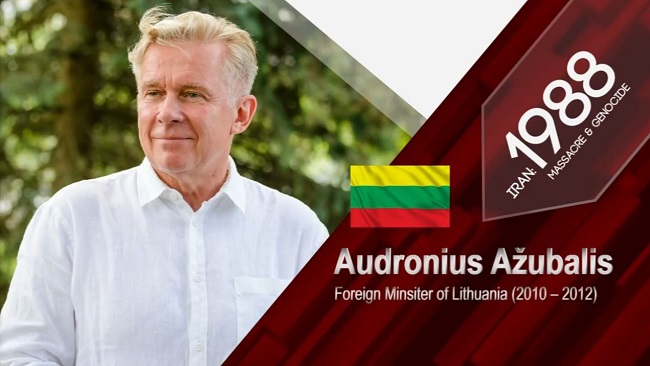Audronius Ažubalis, Minister of Foreign Affairs of Lithuania (2010 – 2012) and Member of Parliament, addressed at the International Conference on the 1988 Massacre, attended by 1,000 Former Political Prisoners — 27 August 2021.
The crime that we are discussing today remains unpunished until now. And those who were responsible for it are still holding key positions in the regime ruling Iran. Khamenei, Iran’s supreme leader who was the president at the time, and Rouhani, both approved the decision — Rouhani’s Minister of Justice — over Death Committees which made decisions on executions in the 1988 massacre. Raisi, Iran’s new President, was a known member of a Death Committee, and yet, he was promoted to be the president instead of facing justice.
Amnesty International made a report in 2018 about this heinous crime titled ‘Blood-soaked Secrets.’ In June 2021, Secretary General of Amnesty International called for Raisi to be investigated for crimes against humanity.
Seven United Nations experts also asked for independent investigation of the massacre. The United Nations Special Rapporteur on Iran too in July 2021 called for an independent inquiry on the extra-judicial killings of 1988.
However, despite the abundant evidence and the witnesses of the 1988 massacre, no one has yet faced justice for this crime against humanity, and the Iranian authorities continue their crimes, including the executions with full impunity, because they see no political will and where United Nations and the Western governments over holding the perpetrators accountable. This is the main issue of the conference.
The 1988 massacre is a crime against humanity, and an international independent investigation is a must. I believe that they have to push for President Raisi to be investigated by the International Court of Justice for crimes against humanity, including murder, enforced disappearances and torture.
I just wanted to mention the EU Global human rights sanctions regime. In December 2019, the European Council, comprised of all leaders of EU member states, welcomed the launch by the High Representative of preparatory work to establish an EU regime of general scope for restrictive measures against serious human rights violations and abuses.
This was adopted by the EU a year later in December 2020 to equip itself for the first time with a framework that will allow it to target individuals, entities, and bodies — including state and non-state actors — responsible for, involved in or associated with serious human rights violations and abuses worldwide, no matter where they occurred. The framework for targeted restrictive measures apply to acts such as genocide, crimes against humanity, and other serious human rights violations or abuses: torture, slavery, extrajudicial killings, arbitrary arrests, or detentions. It will be for the Council acting upon a proposal from a Member State or from the High Representative of the EU for Foreign Affairs and Security Policy to establish a review and amend the sanctions list.
The EU decision empathizes that a promotion and protection of human rights remain a cornerstone and priority of EU external action and reflect the EU’s determination to address serious human rights violations and abuses.
Despite the above decision adopted by the European Council and despite all the calls by Amnesty International and United Nations experts for an independent International investigation over the 1988 massacre in Iran, until today the EU has ignored the crime against humanity perpetrated has in 1988 in Iran, and has shown no reaction toward it, and has not been prepared to implement its own decision in this regard.
I would like to call on the EU authorities to apply the EU Global Human Rights Sanctions regime to Iran’s tyrants and their crimes against humanity. The EU has had a long delay in adopting the above mechanism. However, the Baltic States, including my country Lithuania, introduced national human rights travel ban long before the EU. Therefore, I think Lithuania could take the lead in this regard among the EU members.
Now, I want to quote a famous British philosopher, Edmund Burke: ‘The only thing necessary for the triumph of evil is for good men to do nothing.’ These words are very important in the face of tragic human experiences and challenges. Tolerance and freedom are never stated, and for these ideas to flow freely, good laws are not enough. It takes people of good will who are willing and able to implement them. For too many years, the regime tried to hide this massacre from the eyes of the world. Ladies and gentlemen, thank you for your kind attention.
